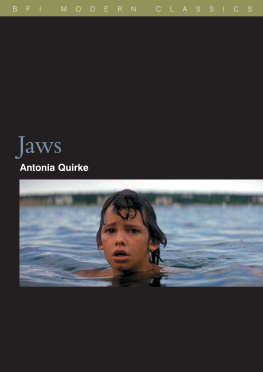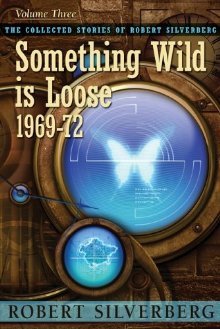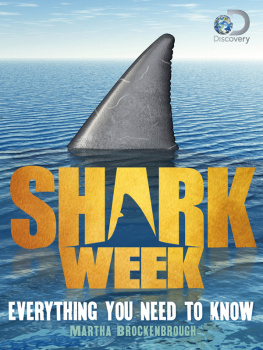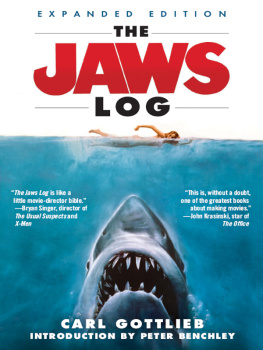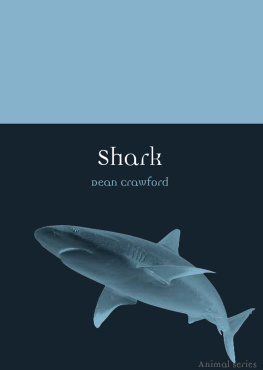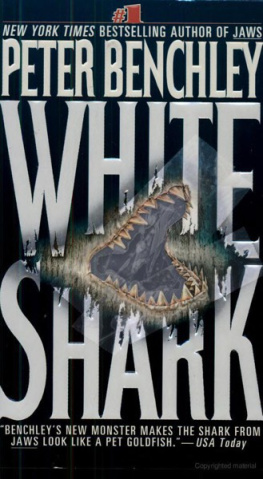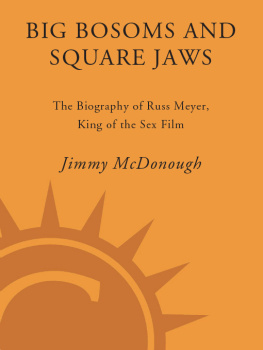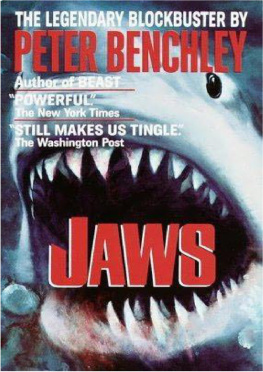Antonia Quirke - Jaws
Here you can read online Antonia Quirke - Jaws full text of the book (entire story) in english for free. Download pdf and epub, get meaning, cover and reviews about this ebook. year: 2019, publisher: Bloomsbury Publishing, genre: Detective and thriller. Description of the work, (preface) as well as reviews are available. Best literature library LitArk.com created for fans of good reading and offers a wide selection of genres:
Romance novel
Science fiction
Adventure
Detective
Science
History
Home and family
Prose
Art
Politics
Computer
Non-fiction
Religion
Business
Children
Humor
Choose a favorite category and find really read worthwhile books. Enjoy immersion in the world of imagination, feel the emotions of the characters or learn something new for yourself, make an fascinating discovery.
- Book:Jaws
- Author:
- Publisher:Bloomsbury Publishing
- Genre:
- Year:2019
- Rating:5 / 5
- Favourites:Add to favourites
- Your mark:
- 100
- 1
- 2
- 3
- 4
- 5
Jaws: summary, description and annotation
We offer to read an annotation, description, summary or preface (depends on what the author of the book "Jaws" wrote himself). If you haven't found the necessary information about the book — write in the comments, we will try to find it.
Jaws — read online for free the complete book (whole text) full work
Below is the text of the book, divided by pages. System saving the place of the last page read, allows you to conveniently read the book "Jaws" online for free, without having to search again every time where you left off. Put a bookmark, and you can go to the page where you finished reading at any time.
Font size:
Interval:
Bookmark:

BFI Modern Classics
Rob White
Series Editor
BFI Modern Classics is a series of critical studies of films produced over the last three decades. An array of writers explore their chosen films, offering a range of perspectives on the dominant art and entertainment medium in contemporary culture. The series gathers together snapshots of our passion for and understanding of recent movies.
Also Published
Eyes Wide Shut
Michel Chion
Heat
Nick James
(see a full list of titles in the series at the back of this book)
Forthcoming
City of Sadness
Berenice Reynaud
Dilwale Dulhaniya Le Jeyenge
Anupama Chopra
The Idiots
John Rockwell
LA Confidential
Manohla Dargis

For Eric Gordon, editor of the Camden New Journal. And James.
Contents
The shark was always a star. In July 1916, a Great White killed four bathers off the New Jersey shore and drove the Great War from the front pages of newspapers all over the world. The incidents became an instant myth, the fish instantly famous. Yet unlike other man-eating creatures, other notorious lions and leopards, it was unanthropomorphisable. It gathered no nicknames, no individual identity. And since no-one could be certain that the shark which was caught and held responsible really was the killer, it retained a certain bogeyman quality. Unexorcised, it diffused into the collective unconscious, reappearing fifty-seven years later in Peter Benchleys thriller Jaws ,which was of no particular merit, even as a time-passing page-turner, but a spectacular success. Herewas one of those stories which seems always to have been nebulously there, unformed but already comprehended, waiting for someone to come along and fix it, nail it, get it down right. And this is the first thing to say about the film of Jaws, which has this property of seeming discovered rather than created. It is definitive. It is the definitive articulation of a myth. It hits the nail right on the head.
Thats the Spielberg touch. The direct hit which renders the film-makers personality less visible than would a glancing blow. Given material too complex for a direct emotional bullseye World War II, for instance, in California, China, Normandy or Central Europe given a subject rather than a sensation, then he becomes both more legible and less himself. Not having an angle is his angle. Being effective is the sum of Spielbergs artistic vision which made him for a long time extraordinarily difficult to categorise. His failures are not failures in an interesting way: they are simply less effective films. So picture him in 1974, one evening during the Jaws shoot, describing to Richard Dreyfuss all the possible angles he could push the film towards. Hitchcockian, Bergmanesque, Kubrickian, Altmanesque, Coppola-esque. Cormanesque. Theres the Melville-thing. The Enemy of the People IbsenWatergate thing. The Vietnam-thing. This is the 1970s! There are subjects to respond to. And meanwhile, seemingly everywhere, his peers are all finding their own distinctive voices or visions: Bogdanovich, Scorsese, Friedkin, Coppola, Malick, Lucas, all carving out niches. Whereas his first feature, The Sugarland Express (a film consistently overrated as underrated) has just failed commercially because, it appears, of its downbeat ending. Is he going to be painted into a shark-and-truck corner because of the perfect but limited Duel? Three times hes tried to get off this monster movie, has pleaded to be allowed something more serious, something which might be Spielbergian. He is twenty-seven, claims hes twenty-six and, naturally, he wants to be an artist, like Orson Welles. And Jaws has one raison dtre to be a financial success.
But although he is under extraordinary pressure (and the pressure really is head-swimmingly intense and unrelenting) simply to get the film made at all, he is in a more important sense freer than he ever has been or will be again. This is an assignment, so he doesnt have to square it with his artistic conscience. It isnt his baby. And everyone knows its an assignment so he doesnt have to be judged by it. The film belongs to a mixture of low genres so he doesnt have to invent tones, only orchestrate them, and he has plenty to play with. He has nothing, particularly, to communicate (and striving too hard to communicate emotion is what has vitiated Spielbergs whole career: its what blights Close Encounters, E.T. and Schindlers List, his three favourite films). His actors are making up their lines which will never happen again. He has no reputation to live up to, no voice he need find. And vitally, his sense of humour has bumped into its perfect vehicle a latent comedy. All he has to do is be effective. To nail that shark.
Which, famously, was not easy. Im not going to detail the nightmarish production in this book since screenwriter Carl Gottliebs classic diary The Jaws Log is an unimprovable record of the shoot and an unsurpassed description of collaboration in film-making. But its worth noting, with regard to the collaborative nature of Jaws, that Spielberg was the driving force behind these four decisions: no stars, real sea, likeable characters instead of the Benchley sourpusses, and a mainly implied shark. (Neither will I detail what happened next, this particularly melancholy history of a succs fou and its whole new species of phenomenon-money the very money that supposedly ruined everything and led to the wasteland of the 1980s. Its a story Peter Biskind has told.)
Scarred by the experience of the shoot, Spielberg was never particularly fond of his smash hit. I look back at that film, he once said, and it seems like it was a different person making it. It was. Gone now that freewheeling, youth-dependent deadpansarcastic sense of humour. Probably Spielberg knows that Jaws brand of sly comedy cannot be planned, and he has never attempted anything like it again. He has made films which are more personal to him, but never anything more personal to his talent and its Spielbergs talent, not his taste, which we can trust. Jaws is his nimblest, crispest and best film, and being so light and foxy, still underrated. Its a minor classic. Or, as we tend to put it, a modern classic.
THIRD FISHERMAN: Master, I marvel how the fishes live in the sea.
FIRST FISHERMAN: Why, as men do a-land; the great ones eat up the little ones.
William Shakespeare, Pericles
1. Shame
Before you know it, before you expect it, theres a sound. The screen is dark, giving us time to settle down, that private second before it all begins. But theres a sound, and we have to listen.
Its the sound of marine life. A whale, perhaps? Dolphins. Sonar. At first it seems to reflect us. Sea-babble to accompany audience-babble, the sea version of the chatter of the cinema audience finding seats and taking off coats and finishing arguments and keeping an eye out for latecomers. But really its the sound of a sea orchestra tuning up, waiting for the soloist. The shark.
As soon as he starts playing, the blather is silenced, on screen and off. He moves through the water this tuba, this double bass, this far end of the piano with a roving eye. Hes at the bottom of the sea, brushing through kelp forests, like a convict escaping through some strange field. John Williams theme is at once serious and comical, solemn and skittish, building until its almost a refrain from
Font size:
Interval:
Bookmark:
Similar books «Jaws»
Look at similar books to Jaws. We have selected literature similar in name and meaning in the hope of providing readers with more options to find new, interesting, not yet read works.
Discussion, reviews of the book Jaws and just readers' own opinions. Leave your comments, write what you think about the work, its meaning or the main characters. Specify what exactly you liked and what you didn't like, and why you think so.

